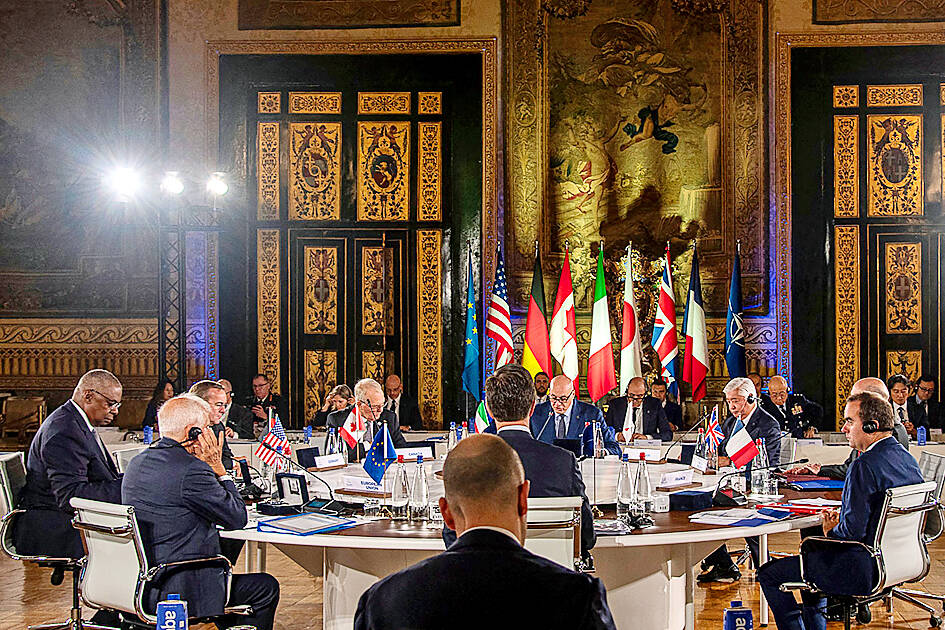G7 defense ministers in a joint statement on Saturday singled out China over a number of concerns, including its “provocative actions” near Taiwan.
The defense ministers of Canada, France, Germany, Italy, Japan, the UK and the US gathered in Naples, Italy, from Friday to yesterday for the group’s first ministerial meeting dedicated to defense.
In the joint declaration, they stressed “enduring unity and common determination to address, in a cohesive and concrete manner, security challenges, at a time in history marked by great instability.”

Photo: Massimiliano De Giorgi / Italian Ministry of Defense / AFP
In addition to voicing support for Ukraine, expressing concern about the escalating conflict in the Middle East and condemning North Korea’s nuclear and ballistic missile programs, the ministers affirmed their “commitment to a free and open Indo-Pacific, based on the rule of law and upholding the principle of the peaceful resolution of disputes without resorting to the threat or use of force.”
“We reaffirm that maintaining peace and stability across the Taiwan Strait is indispensable to international security and prosperity,” it said. “We are concerned about provocative actions, particularly the recent [Chinese] People’s Liberation Army military drills around Taiwan.”
“We call for a peaceful resolution of cross-strait issues,” it added.
The declaration also expressed concern about the situation in the South China Sea.
“There is no legal basis for China’s expansive maritime claims in the South China Sea, and we are strongly opposed to China’s repeated obstruction of freedom of navigation, militarization of disputed features, and coercive and intimidating activities, as well as the dangerous use of coast guard and maritime militia vessels in the South China Sea,” it said.
They also expressed their “deep concern at China’s increasing support to Russia’s war economy” and the “destabilizing actions resulting from the strengthening military cooperation between China and Russia.”
In Taipei, the Ministry of Foreign Affairs thanked the G7 defense ministers for their firm support in maintaining the peaceful “status quo” in the Taiwan Strait.
As a responsible member of the Indo-Pacific region, Taiwan would continue to strengthen cooperation with G7 nations and take concrete actions to defend the universal values of democracy, freedom and human rights, it said.
Separately, the Australian Taiwanese Friendship Association (ATFA) on Saturday expressed gratitude to the Australian Senate, which on Aug. 21 unanimously passed a motion stating that UN General Assembly Resolution 2758 does not establish the People’s Republic of China’s sovereignty over Taiwan and does not determine the future status of Taiwan in the UN.
New ATFA president Kathy Sieh (謝明君) made the remark at the 27th inauguration ceremony of the association in Sydney.
Taiwanese in Australia urged the Australian government to take a leadership role in advocating for Taiwan’s participation in international organizations, she said, adding that the presidents of other Taiwanese friendship associations in Australia and Taiwan-related civic groups also gathered at the ceremony to show their support for Taiwan’s participation in the UN.

CHAOS: Iranians took to the streets playing celebratory music after reports of Khamenei’s death on Saturday, while mourners also gathered in Tehran yesterday Iranian Supreme Leader Ayatollah Ali Khamenei was killed in a major attack on Iran launched by Israel and the US, throwing the future of the Islamic republic into doubt and raising the risk of regional instability. Iranian state television and the state-run IRNA news agency announced the 86-year-old’s death early yesterday. US President Donald Trump said it gave Iranians their “greatest chance” to “take back” their country. The announcements came after a joint US and Israeli aerial bombardment that targeted Iranian military and governmental sites. Trump said the “heavy and pinpoint bombing” would continue through the week or as long

TRUST: The KMT said it respected the US’ timing and considerations, and hoped it would continue to honor its commitments to helping Taiwan bolster its defenses and deterrence US President Donald Trump is delaying a multibillion-dollar arms sale to Taiwan to ensure his visit to Beijing is successful, a New York Times report said. The weapons sales package has stalled in the US Department of State, the report said, citing US officials it did not identify. The White House has told agencies not to push forward ahead of Trump’s meeting with Chinese President Xi Jinping (習近平), it said. The two last month held a phone call to discuss trade and geopolitical flashpoints ahead of the summit. Xi raised the Taiwan issue and urged the US to handle arms sales to

BIG SPENDERS: Foreign investors bought the most Taiwan equities since 2005, signaling confidence that an AI boom would continue to benefit chipmakers Taiwan Semiconductor Manufacturing Co’s (TSMC, 台積電) market capitalization swelled to US$2 trillion for the first time following a 4.25 percent rally in its American depositary receipts (ADR) overnight, putting the world’s biggest contract chipmaker sixth on the list of the world’s biggest companies by market capitalization, just behind Amazon.com Inc. The site CompaniesMarketcap.com ranked TSMC ahead of Saudi Aramco and Meta Platforms Inc. The Taiwanese company’s ADRs on Tuesday surged to US$385.75 on the New York Stock Exchange, as strong demand for artificial intelligence (AI) applications led to chip supply constraints and boost revenue growth to record-breaking levels. Each TSMC ADR represents

State-run CPC Corp, Taiwan (CPC, 台灣中油) yesterday said that it had confirmed on Saturday night with its liquefied natural gas (LNG) and crude oil suppliers that shipments are proceeding as scheduled and that domestic supplies remain unaffected. The CPC yesterday announced the gasoline and diesel prices will rise by NT$0.2 and NT$0.4 per liter, respectively, starting Monday, citing Middle East tensions and blizzards in the eastern United States. CPC also iterated it has been reducing the proportion of crude oil imports from the Middle East and diversifying its supply sources in the past few years in response to geopolitical risks, expanding